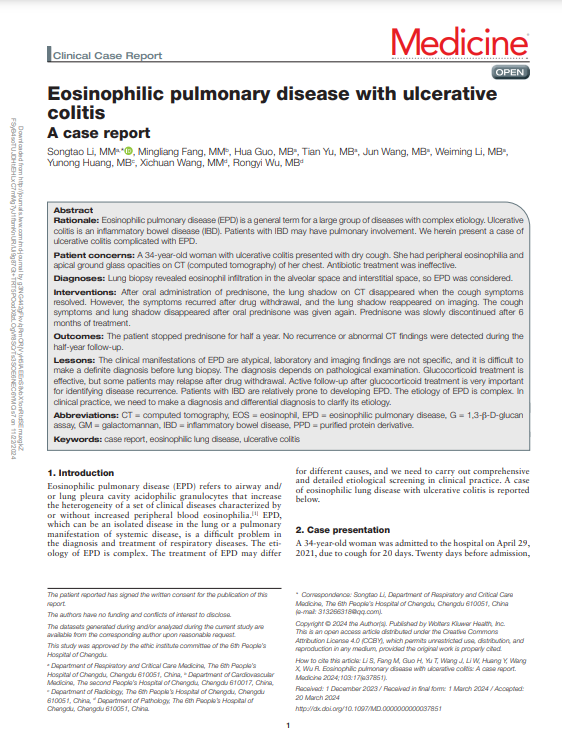Eosinophilic pulmonary disease with ulcerative colitis: A case report
April 2024
Medicine
Abstract
Rationale:
Eosinophilic pulmonary disease (EPD) is a general term for a large group of diseases with complex etiology. Ulcerative colitis is an inflammatory bowel disease (IBD). Patients with IBD may have pulmonary involvement. We herein present a case of ulcerative colitis complicated with EPD.
Patient concerns:
A 34-year-old woman with ulcerative colitis presented with dry cough. She had peripheral eosinophilia and apical ground glass opacities on CT (computed tomography) of her chest. Antibiotic treatment was ineffective.
Diagnoses:
Lung biopsy revealed eosinophil infiltration in the alveolar space and interstitial space, so EPD was considered.
Interventions:
After oral administration of prednisone, the lung shadow on CT disappeared when the cough symptoms resolved. However, the symptoms recurred after drug withdrawal, and the lung shadow reappeared on imaging. The cough symptoms and lung shadow disappeared after oral prednisone was given again. Prednisone was slowly discontinued after 6 months of treatment.
Outcomes:
The patient stopped prednisone for half a year. No recurrence or abnormal CT findings were detected during the half-year follow-up.
Lessons:
The clinical manifestations of EPD are atypical, laboratory and imaging findings are not specific, and it is difficult to make a definite diagnosis before lung biopsy. The diagnosis depends on pathological examination. Glucocorticoid treatment is effective, but some patients may relapse after drug withdrawal. Active follow-up after glucocorticoid treatment is very important for identifying disease recurrence. Patients with IBD are relatively prone to developing EPD. The etiology of EPD is complex. In clinical practice, we need to make a diagnosis and differential diagnosis to clarify its etiology.

